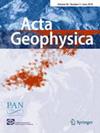中欧地区矿物粉尘光学特性的模拟和观测
IF 2.1
4区 地球科学
Q2 GEOCHEMISTRY & GEOPHYSICS
引用次数: 8
摘要
本文的重点是撒哈拉沙尘输送到中欧/波兰;我们利用NAAPS、MACC、AERONET的数据以及2012年6月HyMountEcos活动期间获得的观测数据,比较了大气撒哈拉沙尘的特性。十年的沙尘气候学研究表明,撒哈拉沙尘向中欧的远距离输送主要发生在春季和夏季。HYSPLIT反轨迹显示气团主要在11月输送,但与模拟的尘埃光学深度最大值不符。NAAPS模型显示4 ~ 5月的尘埃光学深度最大值(~0.04 ~ 0.05,550 nm),而MACC模型的峰值更宽(~0.04)。在中欧地区矿物粉尘发生期间,14% (NAAPS) / 12% (MACC)的日数尘埃光学深度大于0.05,4% (NAAPS) / 2.5% (MACC)的日数尘埃光学深度大于0.1。HyMountEcos活动于2012年6月至7月在Karkonosze山区开展。分析包括来自激光雷达、太阳光度计的遥感数据,以及来自NAAPS、MACC、DREAM8b模型的数值模拟。模拟与观测的比较表明模式有能力合理地再现气溶胶垂直分布及其时间变率。然而,模拟和测量的aod之间存在显著差异。MACC模型的一致性最好。本文章由计算机程序翻译,如有差异,请以英文原文为准。
Modelling and Observation of Mineral Dust Optical Properties over Central Europe
This paper is focused on Saharan dust transport to Central Europe/Poland; we compare properties of atmospheric Saharan dust using data from NAAPS, MACC, AERONET as well as observations obtained during HyMountEcos campaign in June 2012. Ten years of dust climatology shows that long-range transport of Saharan dust to Central Europe is mostly during spring and summer. HYSPLIT back-trajectories indicate airmass transport mainly in November, but it does not agree with modeled maxima of dust optical depth. NAAPS model shows maximum of dust optical depth (~0.04–0.05, 550 nm) in April–May, but the MACC modeled peak is broader (~0.04). During occurrence of mineral dust over Central-Europe for 14% (NAAPS) / 12% (MACC) of days dust optical depths are above 0.05 and during 4% (NAAPS) / 2.5% (MACC) of days dust optical depths exceed 0.1. The HyMountEcos campaign took place in June–July 2012 in the mountainous region of Karkonosze. The analysis includes remote sensing data from lidars, sunphotometers, and numerical simulations from NAAPS, MACC, DREAM8b models. Comparison of simulations with observations demonstrates the ability of models to reasonably reproduce aerosol vertical distributions and their temporal variability. However, significant differences between simulated and measured AODs were found. The best agreement was achieved for MACC model.
求助全文
通过发布文献求助,成功后即可免费获取论文全文。
去求助
来源期刊

Acta Geophysica
地学-地球化学与地球物理
CiteScore
3.90
自引率
13.00%
发文量
251
审稿时长
5.3 months
期刊介绍:
Acta Geophysica is open to all kinds of manuscripts including research and review articles, short communications, comments to published papers, letters to the Editor as well as book reviews. Some of the issues are fully devoted to particular topics; we do encourage proposals for such topical issues. We accept submissions from scientists world-wide, offering high scientific and editorial standard and comprehensive treatment of the discussed topics.
 求助内容:
求助内容: 应助结果提醒方式:
应助结果提醒方式:


